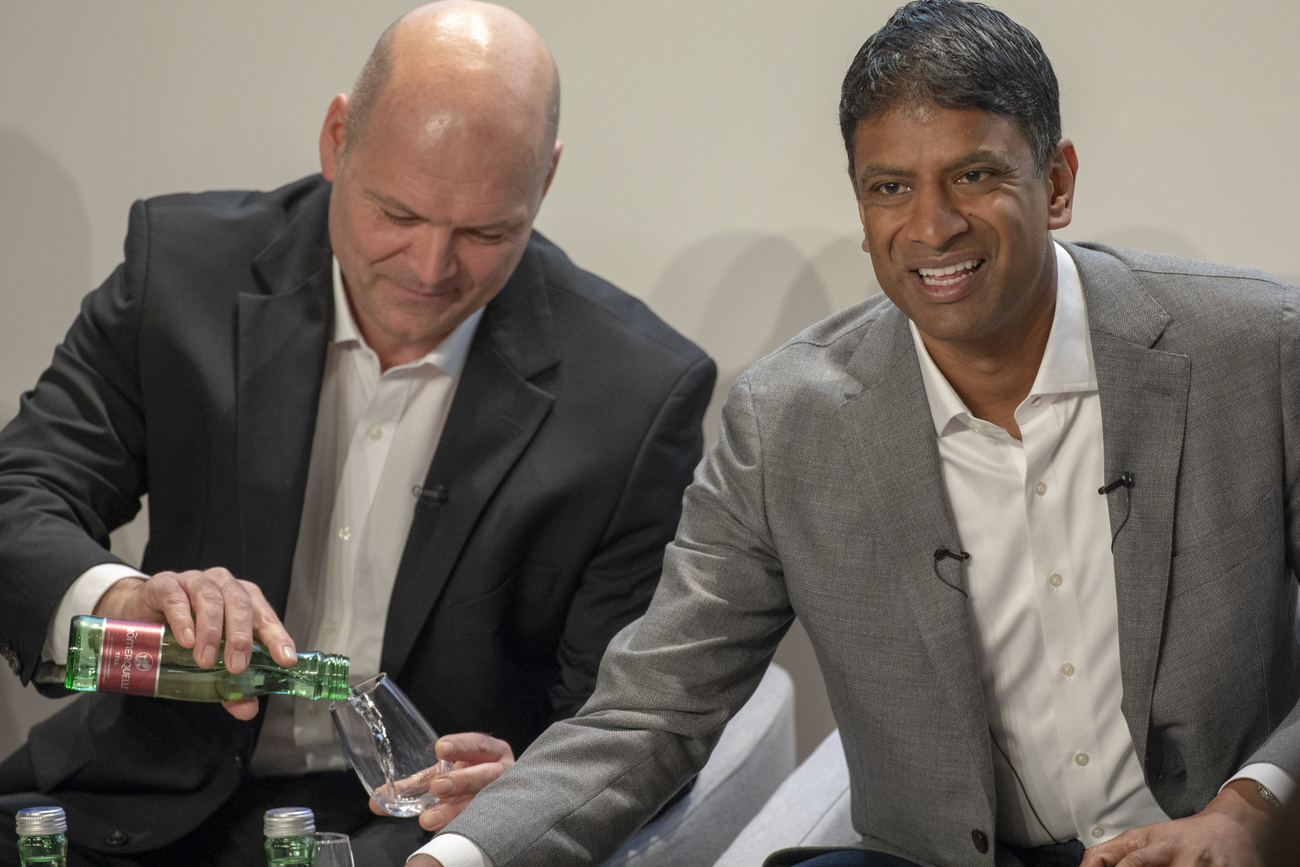Swiss CEOs earn higher salaries and bonuses in 2023

Salaries and bonuses for the executives of large Swiss companies rose again last year. Although multi-million salary packages have been the subject of public criticism for years, shareholders waved them through.
In 2023, 17 of the 23 companies represented in the Swiss Leader Index (SLI) that have already published their annual report paid their CEOs more than in the previous year. On average, CEO salaries and bonuses rose by 3.3% compared to the previous year, according to an analysis by the news agency AWP.
This continues the trend of steadily rising bonuses that has been seen in recent years and was only interrupted in 2022 when low share prices reduced the value of dividend payments.
Salary doubled for Novartis CEO
The highest earner last year was Vasant Narasimhan, CEO of Novartis. His total remuneration reached CHF16.25 million ($17.89 million), a new record since the adoption of the so-called “Minder initiative” in 2013, which gave shareholders a veto right over the salaries of executives and board members of listed companies. Like all CEOs of listed companies, his remuneration consisted of a fixed salary paid out in cash and various bonus components. The latter are often paid out in the form of shares and sometimes with a time lag.
In its annual report, Novartis explains that the CEO’s salary almost doubled from 2022 to 2023 because the company had achieved or exceeded all the targets set in the bonus programmes under Narasimhan’s leadership.
Criticism of UBS boss Ermotti’s salary
Not much lower was the compensation paid to Sergio Ermotti, who took over the helm of UBS again after the emergency takeover of Credit Suisse in April last year. Ermotti received CHF14.4 million for his nine months at the bank. Of this, CHF2.1 million was a fixed salary and CHF12.3 million was distributed among the variable salary components.
The amount of the UBS CEO’s remuneration was criticised even by “pro business” politicians. Radical-Liberal Party leader Thierry Burkart recently said in an interview that such high salaries, which were made possible thanks to a state guarantee, were “simply a slap in the face” for working people. At the same time, however, the senator from canton Aargau also pointed out that it was ultimately the owners of a company who decided what was a fair salary for the managers’ performance.
Shareholders approve bonuses
Meanwhile, there seems to be broad agreement among shareholders that compensation for CEOs is appropriate. When the annual general meetings of large corporations vote on bonus models for management, the approval rates are usually well over 90%. And in retrospective votes on remuneration reports, the approval rate is usually somewhat lower, but still well over 80%.
On the other hand, companies also face consequences of their own accord if management fails to deliver. If a company shows weak performance or even stumbles, cuts are made. For example, Philipp Rickenbacher’s bonus was cancelled. Rickenbacher was head of Bank Julius Baer and resigned at the beginning of February due to the losses in connection with the Signa property empire. At CHF1.7 million, he received a total payout that was over 70% lower than in 2022.
For the comparison and analysis of CEO remuneration, the salary and bonus information published in the annual reports was considered and, where necessary, different valuation methods were standardised.
Six SLI companies not included
Of the total of 29 SLI companies, some have not yet published their remuneration reports from last year. Specifically, this is the case for Logitech, Richemont, Swiss Life and Sonova.
Schindler and Sandoz were also not included in the analysis. The escalator and lift manufacturer currently has no CEO. Instead, Silvio Napoli, Chairman of the Board of Directors, manages the company in a dual mandate. Sandoz, the generic drug manufacturer, on the other hand, has only been listed on the stock exchange as an independent company since autumn, which is why the published figures are not yet comparable with those of other companies.
Adapted from German by DeepL/dkk/ac
This news story has been written and carefully fact-checked by an external editorial team. At SWI swissinfo.ch we select the most relevant news for an international audience and use automatic translation tools such as DeepL to translate it into English. Providing you with automatically translated news gives us the time to write more in-depth articles.
If you want to know more about how we work, have a look here, and if you have feedback on this news story please write to english@swissinfo.ch.

In compliance with the JTI standards
More: SWI swissinfo.ch certified by the Journalism Trust Initiative


















You can find an overview of ongoing debates with our journalists here . Please join us!
If you want to start a conversation about a topic raised in this article or want to report factual errors, email us at english@swissinfo.ch.